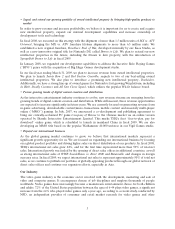THQ 2008 Annual Report Download - page 20
Download and view the complete annual report
Please find page 20 of the 2008 THQ annual report below. You can navigate through the pages in the report by either clicking on the pages listed below, or by using the keyword search tool below to find specific information within the annual report.marketing expenditures to maintain sales of our titles. Increased expenses without corresponding increased
sales could reduce our profit margins and thus have a negative effect on our business and financial results.
Lack of retailer support for categories in which we publish games could negatively affect the sales of our products.
In fiscal 2008, retailers strongly supported games that were music or peripheral-based and we did not
publish any games in this category. Future lack of retailer support for our key games could cause lower
sales of such games, negatively affecting our revenue and profitability.
Increased sales of used video game products could lower our sales. Increased sales of used video games, which
are generally priced lower than new video games, by one of our key customers could negatively affect our
sales of new titles and thus our revenues.
Risk factors related to competition:
Competitive launches may negatively affect the sales of our games. We compete for consumer dollars with
several other video game publishers and consumers must make choices among available games. If we make
our games available for sale at the same time as many other new games become available, consumers may
choose to spend their money on products published by our competitors rather than our products and
retailers may choose to give more shelf space to our competitors’ products, leaving less space to sell our
products. Since the life cycle of a game is short, strong sales of our competitors’ games could negatively
affect the sales of our games.
Competition in the interactive software entertainment industry may lead to reduced sales of our products and
reduced market share. Our industry is intensely competitive. We compete for both the sale of games and
licenses to properties with the platform manufacturers and other publishers. Such competition could
negatively affect sales of our games as follows:
Development of software by hardware manufacturers. Microsoft, Nintendo and Sony have each increased
development efforts of software for their own hardware platforms. As a result of their commanding
positions in the industry, the manufacturers may have better bargaining positions with respect to retail
pricing, shelf space and retailer accommodations than do any of their licensees, including us. Additionally,
the manufacturers can bundle their software with their hardware, creating less demand for individual sales
of our products.
Development of software and online games by intellectual property owners. As discussed above, a significant
portion of our revenue is due to sales of games based upon licensed properties. In recent years, some of
our key licensors, including Disney and Warner Bros., have increased their development of video games,
which could lead to such licensors not renewing our licenses to publish games based upon their properties
or not grant future licenses to develop games based upon such properties. If we do not publish such games,
our revenue could be significantly affected.
Competition for licenses. Some of our competitors have greater name recognition among consumers and
licensors of properties, a broader product line, or greater financial, marketing and other resources than we
do. Accordingly, these competitors may be able to market their products more effectively or make larger
offers or guarantees in connection with the acquisition of licensed properties. As competition for popular
properties increases, our cost of acquiring licenses for such properties may increase, resulting in reduced
margins.
Competition with emerging forms of home-based entertainment may reduce sales of our products. We also
compete with other forms of entertainment and leisure activities. For example, we believe the overall
growth in the use of the internet and online services by consumers may pose a competitive threat if
customers and potential customers spend less of their available time using interactive entertainment
software and more using the internet and online services.
12
























